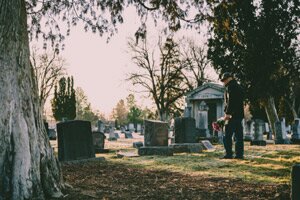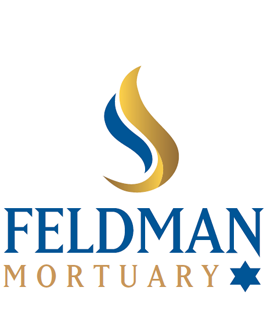We're here for you 24/7/365
Call Now (303) 322-7764 or (855) 670-2263
Partnering With a Natural Provider for Funeral and Cremation in Denver, CO
Feldman Mortuary is a Jewish mortuary that provides appropriate arrangements for those who follow the customs and traditions of Judaism. When it comes to funerals and memorial services, Feldman Mortuary is the go-to provider around Denver metro area since 1936. Our beautiful chapel and versatile event venues make us the perfect choice for families looking for a memorable funeral or memorial service. We offer a wide range of services to meet your needs, plus our professional staff will guide you through every step of the planning process. Contact us at 303-322-7764.
 Do you find yourself in need of making plans for services related to a funeral and cremation in Denver, CO? If so, the compassionate professionals at Feldman Mortuary are here to help you. There are solutions to lay your loved one to rest in a respectful and earth-friendly way. Our compassionate team is always looking to expand offerings to meet the needs of our clients and their families.
Do you find yourself in need of making plans for services related to a funeral and cremation in Denver, CO? If so, the compassionate professionals at Feldman Mortuary are here to help you. There are solutions to lay your loved one to rest in a respectful and earth-friendly way. Our compassionate team is always looking to expand offerings to meet the needs of our clients and their families.
Feldman Mortuary was founded to answer the needs of the greater Denver local Jewish population more than 90 years ago. As that faith tradition favors less invasive funerary practices, this niche has always been our specialty. We welcome and assist families from many backgrounds and continue to support our Jewish friends and neighbors during deeply challenging circumstances.
Do No Harm: Viable Alternatives for Funeral and Cremation in Denver, CO
Sometimes people are surprised to learn just how many options there are when preparing the remains for disposition. Remember, there are also ways to make mainstream funerary practices more natural if you need to go a more traditional route. Let’s discuss some of these solutions here.
Best Natural Burial Practices: More and more cemeteries and burial parks offer exclusive areas and sections dedicated to natural or “green” burial solutions. These can have a range of rules that regulate the exclusion of some aspects, including embalmed bodies, synthetic caskets, and burial vaults. Graves may be dug without heavy machinery to protect the environment and reduce the settling of existing graves. Natural elements such as stones or shrubs may be required to mark gravesites instead of manufactured headstones.
Water Cremation: Though this is a newer practice, it has roots dating back into the 1800s. An alkali solution is used to “dissolve” the deceased remains in a controlled, sealed chamber. Agitating movement, chemical compounds, and water bring this accelerated decomposition about in just a matter of hours. The result is very similar to what nature would produce when given the time. The hardest parts of the skeletal body and a liquid solution are left at the end of the process. The bones are then granularized into a powdery substance similar to “ashes.”
Fire Cremation: Cremation by fire is another solution for body disposition. The deceased remains are placed in the retort to be incinerated by fire. The flames are usually spent within approximately two hours or less. The only remaining remnants in the chamber are portions of the skeletal remains. Like water cremation, these bone fragments are collected and processed into grains for the family to receive back for final placement.
Biological Human Composting: If cremation and burial are options you would prefer to avoid, human composting is another solution for body disposition. This process results in the molecular breakdown of tissues until the body has returned to the “dust of the earth” state. This natural process is accelerated by surrounding the body with biological materials such as straw and other compounds that will help bring this result about in a few months.
Laying a Loved One to Rest With the Right Honoring Ceremony
Though it isn’t required, grief counselors and experts widely recommend some type of honoring ceremony to help bring closure and facilitate a healing path for survivors of this loss. If you choose to have a public ceremony, it can be planned in connection with whatever type of body disposition best meets the needs of your situation. Combining services for a funeral and cremation in Denver, CO, can be facilitated for the same individual as long as the funeral service is held first.
Another option for a meaningful honoring ceremony includes a Celebration of Life. This style of service can be less formal than a funeral, or it could be used in a funeral format. Often Celebration of Life events are designed around a memorial service where the casketed deceased remains are not part of the service itself.
Receptions can also be planned to help you lay your loved one to rest well. There may be drinks, refreshments, or even a full course dinner or luncheon. In addition, the reception creates space in the schedule for long-lost relatives and friends to renew acquaintances and support one another at this time of shared loss and sadness. Often the reception is held as the culminating event after all other funerary services are completed.
Choose a Qualified and Experienced Provider of Alternative Death Care Solutions
If life has handed you this difficult task, you need not approach the final arrangements without good support. For all of your needs with death care and honoring events, including funeral and cremation in Denver, CO, partner with an experienced, qualified provider. Give yourself access to the full array of alternatives to find the most appropriate solutions for your loved one. Pre-arrangement of your future needs can also be made. Call Feldman Mortuary at (303) 322-7764. Our full-service facilities can be accessed at 1673 York Street, Denver, CO 80206.
Funeral Home and Cremations FAQs
Can You Pay for Your Cremation Before You Die?
Yes, you can pre-pay for your cremation. This is a popular choice for many people because it gives peace of mind knowing that their loved ones will not have to worry about funeral expenses when they pass away. Many funeral homes like us offer comfortable payment plans for pre-paying for cremations, and some will even allow you to pay in installments. So, if you're interested in this option, be sure to ask your local funeral home about their payment policies.
What Funeral Expenses Are Tax Deductible?
The cost of a funeral is tax-deductible if it is for a relative. The deduction is limited to $3,000. If the funeral expenses are more than $3,000, the excess can be amortized over a period of up to seven years. For example, if the funeral expenses were $4,000, you could deduct $571 per year for seven years.
If the death was because of an illness that was diagnosed within 60 days prior to death, all the funeral expenses are tax-deductible.
Please note that these are general rules, and you should check with your accountant or tax advisor to determine if you are eligible for this deduction. You can visit here if you wish to know more legal considerations.
Should the Grieving Family be Responsible for Cleanup After the Funeral?
There is no right or wrong answer to this question, as it depends on the specific Funeral home’s policy and the family's preferences. Some families may feel that it is their responsibility to clean up after the funeral, while others may prefer to have a funeral home take care of everything.
Ideally, the grieving family should be given the option of having someone else deal with the cleanup duties and whatnot so they can focus on grieving and healing. If a funeral home is hired, they will typically take care of all cleanup duties. However, if the family prefers to handle things themselves, they should make sure to ask someone else for help in order to avoid becoming overwhelmed.
Extra Placeholder, pls remove.

Contact Us
The death of a loved one is among the most difficult circumstances any of us will face. We’re here to help you through this challenging time. With compassion and deep experience, we’ll help you make informed choices and guide you through the many details of preparing for a funeral service or celebration of life.
If a death has occurred, call us at (303) 322-7764, or 855-670-2263 anytime, day or night. For preplanning and other longer-term needs, please contact Jamie Sarche [sar-shay] either by her email address below or by calling the office during regular business hours.
Contact:
Information: director@feldmanmortuary.com
Pre-planning: jamie@feldmanmortuary.com




